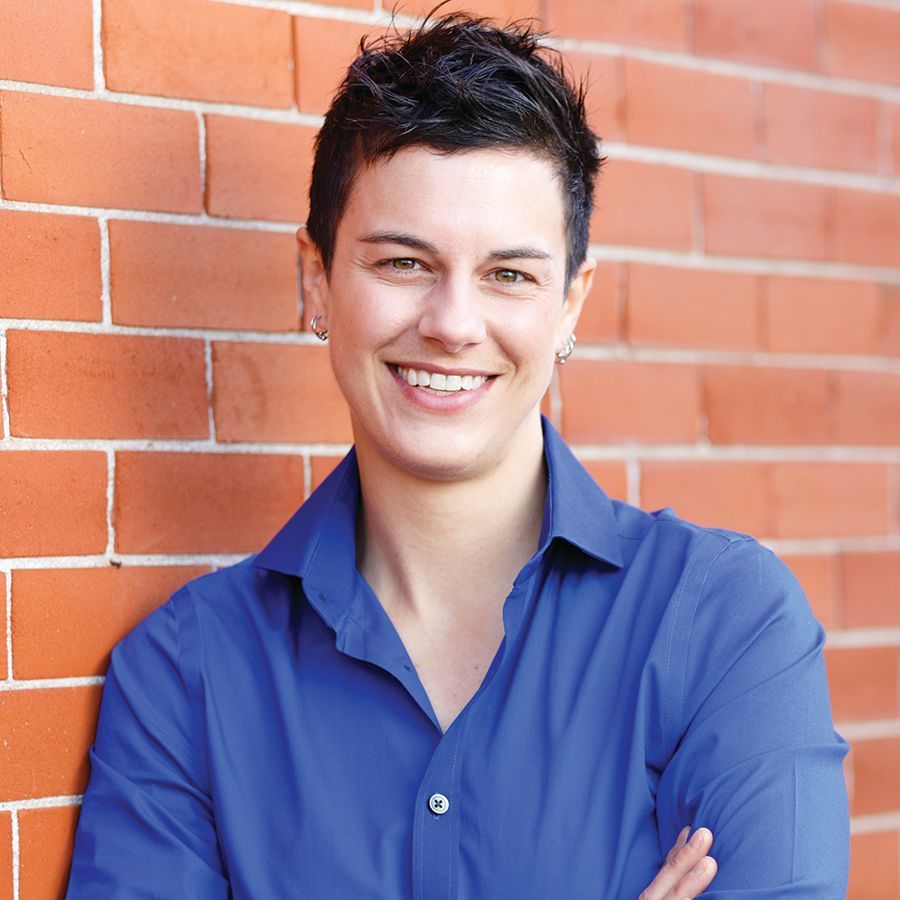LDI News
Showing Up Authentically

LIWP Leader Spotlight
Sarah Burgamy, PhD
Clinical Psychologist and Founder of PhoenixRISE
What was your biggest takeaway from LIWP?
That is not very hard to answer: honestly, the connections. I think many of us in psychology are relational by nature. It truly is about making contact and because I participated in a year where it wasn’t a global pandemic, I had the opportunity to be in a room with so many wonderfully accomplished people. Not just accomplished, but driven, transparent, and honest about the things about which folks were insecure, challenges in the field, or just the personal and professional dovetailing together. There were folks from a lot of different backgrounds, and those connections have persisted to where, for example, during conventions (and in the case of last year’s virtual convention), I would find myself in sessions chatting with my LIWP alumna. It is a network of really amazing individuals. And you support each other as well, because many of you may be going through the same trajectory.
Yes, even looking back to the goals I had during LIWP, what I was articulating, and what I was up to. It’s interesting because since then I’ve met the goal I had set because I thought that’s where I was heading, and then I changed directions again. In some ways, being a part of LIWP and having an open conversation gave us a lot of permission to say, “You know, I set a goal, I achieve that goal, and I decide if that will be the be-all end-all or set a different goal.” And it doesn’t even have to be in the “field”. It can be a quality-of-life goal, which has come in handy in the past year.
How did you apply your LIWP learning to your life and career?
A little less tangibly than sitting down, setting a goal, and looking at that goal. I do think there’s a real power in setting goals and saying, “Why don’t you sit down, put some dates on the calendar, or set some expectations for yourself?” Because I will say that after getting out of grad school and having no one other than my clinical advisor look over my shoulder anymore, no one would tell me, “This is where you need to go and this is what you need to do.” I would then create goals in my head and set an intention of going in that direction, and if I miss it, it’s not a failure, it’s a checkpoint, which is what LIWP helped me with. I am a lifelong athlete (rugby and swimming) and with swimming it’s constantly achieving and doing my best, but I just stopped making those types of goals and somehow that did not translate into my professional life. So, there is some real power in setting an expectation and seeing where you go, where it takes you. The less tangible part is the permission to not know—learning that it’s okay to not know. It’s okay to have an idea that you think you’re aiming for and then to change your mind.
What’s is the best advice you’ve ever received?
I shared with you that I recently lost my 100-year-old grandmother, who was a big figure in the family. She was the most well-read individual I ever met. She had all of her kids and went back to school and was an all-but-dissertation English PhD. She won blue ribbons for her knitting. She had things that were your traditional grandma things, and then she also read my dissertation on gender identity and asked questions—mind you, she was born in the 1920s. So, I was reflecting on that, on the strong female presence in my life, and also on why I am so passionate about gender inequities, and I thought, “It’s no accident, I have these role models.” Not just my grandmother: My mother is a formidable person and emotionally was my compass for my whole life. It was really causing me to think that you don’t just show up in the world and or show up from the ether, you come from people that influence you positively or a mixture. But I was feeling a real grounding being there, in the plains of Texas for my grandmother’s funeral, which is not where I grew up, but sort of that sensibility of looking around thinking, “Gosh, my family has been in this land for a long time and now I’m not sure when I’ll be back and why,” and it was a really weird sensibility of, where do we anchor? And do we always anchor in places where we always stand? And I think the answer is no.
Even my involvement with LIWP, even though it was a year of involvement enrolled in the leadership program, I think of it as little anchors you throw out and your little anchors stay there, even if you’re not there. And I think that is why when I was asked to be part of the LIWP Advisory Committee it wasn’t hard to decide, because I had an anchor there, it wasn’t a new connection. And to me, whether that’s the plains of Texas, the Colorado mountains, or something like LIWP, I have a tendency to follow those lines back to where I’ve had something influential occur.
And this has been shared many times before, that AC members want to give back because LIWP has given them so much.
I think of some of the folks that started LIWP before it was LIWP—for example, Helen Coons is one of the first people I met when I joined APA Council as the Colorado representative. I was seated at the table with Helen, and I didn’t know her, but after I got to know her, she kept putting things in front of me. The experience I’ve had with this is that the person sees something in you but doesn’t tell you, they just put things in front of you and ask, “What do you think of this?” That’s how I ended up in Council as the president of my state association, because someone asked, “Don’t you think you should run?” The fact that somebody else says it’s possible—it matters. Sometimes we blaze trails where we aren’t “supposed to,” but a lot of times, someone just tells us, “Do you want to go in that direction? You should go in that direction; I’m not blazing the trail for you but I can walk with you.” I don’t know what prompts people to do that, but it’s not a job. To me, the part where I joined the AC, it was not only this giving up, but it was this sense of that same experience repeated. You must see something and maybe I feel it too, and even if I don’t know what exactly it is that I’m bringing with me, let’s find out.
What advice would you give to other women who are midcareer in psychology?
What I find tricky about giving advice is that there is such a self-reference component: I go back to something that’s been helpful to me that may not be helpful to the next person. Because I’m so focused on my own life, on how to remember that I don’t have to have a unidimensional life, that my life doesn’t have to be majority career or majority family, really anything. I think sometimes, being on an achieving track, I put blinders on the sides of my face and look ahead and forget to walk the dog just because I like walking the dog, not because the dog needs to be walked. So, right now I’m in this reflective part of my midcareer where I think, “Okay, well here I am,” and I guess the advice I’d give is, it’s okay to give inventory. I catch myself saying to my clients a lot, “Just because you can doesn’t mean you should.”
What can you share about your LIWP alumna sisters about what you learned about yourself in the process?
What got reinforced for me was showing up authentically—and it’s not just valuable, it’s been “the thing” that’s really informed my notion of leadership. Especially as somebody that is gender nonconforming or androgynous, where I identify as a woman but my experience with gender is not always quite so binary and simple. Growing up, that was challenging: There is this sort of permission to be yourself up to a point and then people say, “Okay….” It’s a weird hourglass, where it starts wide and we let kids be rambunctious and expansive, and then we do this thing where we pinch the middle and go, “Now you have to figure out what the rules are, what you’re supposed to do, what you’re supposed to be.” I think there is value in that to a degree because there’s a certain level of learning how to do that in a way that allows you to walk comfortably in different spaces and navigate, and it also teaches you how to get into those spaces and expand again. And I think that that’s been the most important thing I’ve learned about myself, having both competencies, of authenticity and expansiveness, but also having the competency of knowing and reading what’s happening in this space. When you put the two together you have more options. And I’m surprised at times that by doing that, people listen. It’s an interesting thing where you join any cultural environment, if you’re able to take inventory and ask, “Where am I?” then you can find a way to show up in that space in a way that people think, “Oh you sort of understand where you are and who you are. You’re able to do both pieces.” I don’t think that’s always easy or possible. I think I have a lot of arenas of personal identity where I have a lot of privilege and a lot of leverage. And then I think it’s maximizing those areas of privilege to bring the other parts of myself to make space for other people who may not have the same access.
Any other advice for your LIWP sisters?
The only thing I would add is that the usage of negotiating language is sort of a challenge where I want to reference the language of “women” and “woman,” and at the same time I want to move away from it, so I live in this tension. Because I think we’re living in a very interesting time, not just in LIWP but in general, and what’s exciting about it is that we’re having these very complicated and meaningful conversations: What does it mean to be a Leadership Institute for Women in Psychology? What do we mean by that and who do we mean? And I think we’re navigating that now; it’ll be just interesting to see where we go.
From LeadHERship, Vol. 5 (2021)
